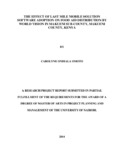| dc.description.abstract | The purpose of this study was to assess the effect of Last Mile Mobile Solution (LMMS) on food
aid distribution by World Vision in Makueni Sub-County, Makueni County, Kenya. This
research was guided by the following objectives; to establish the effect of LMMS registration on
distribution of food aid, to assess the effect of LMMS accountability on distribution of food aid,
and to establish the influence of LMMS harmonization on distribution of food aid in Makueni
Sub-County. The study targeted 830 households receiving food aid and 20 World Vision staff
working in Makueni Sub-County. Simple random sampling technique was used in the study to
select 85 respondents. The information for the study was gathered by use of questionnaires as the
main research instrument. The questionnaires were subjected to the heads of households and a
key informant one to the World Vision staff working in Makueni Sub-county. The collected raw
data was coded and analyzed by both descriptive and inferential methods using Statistical
Package for Social Scientist (SPSS) software. From the findings of the study, the researcher
concluded that; LMMS has created a new platform for aid distribution that is vastly different and
more efficient when it comes to registering, capturing data and retrieving records of beneficiaries
to both recipients and users. This is because a single distribution projects are completed at least
50% faster. Multiple distribution projects, where registration is required only once, show a time
savings of 90% or more. Secondly, a digitally traceable record of every distribution reduces the
risk of fraud and ensures that the right items and quantities are distributed fairly thus enhancing
accountability. Important as accountability is, there are even bigger benefits with the data we
collected, we can account – down to the household level – where aid has been distributed and
prepare periodic and annual reports demonstrating the efficiency and effectiveness of our efforts.
Lastly, LMMS harmonization has improved food distribution by avoiding duplication, sharing
information through networking and improved donor relationship. This research study hopes to
inform the donor agencies to improve and expand their service delivery to needy communities
economically thus ensuring equitable distribution to all. It recommends that the relief agencies
and the government should adopt new and innovative ways of delivering aid to the targeted
people through partnerships with Information technology experts. It is also recommended that
through partnerships with IT experts, harmonization/coordination of various donor agencies
operating in aid distribution will reduce transaction costs by avoiding distribution overlaps. | en_US |

